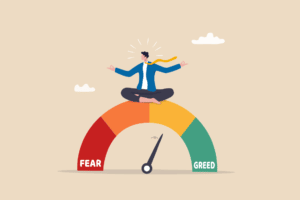
The Fear and Greed Index, which is the one that measures the extent to which investors in an asset are facing a period of fear or greed, is used to track market sentiment, both in the crypto world with indexes created for Bitcoin and Ethereum, but also in the traditional market.
One of the first such indexes was created by CNN Money for the stock market, and this has since become the benchmark for traders in the industry.
The parameters used in the calculation of the Fear and Greed index

This index is based on as many as seven indicators, which are:
- Safe haven demand, which is the demand for assets that are generally thought not to lose their value over time (e.g., gold is historically considered to be such);
- Stock price momentum, which is the speed with which prices change over time;
- Stock price strength, which is the percentage strength of one asset relative to another asset;
- Stock price breadth, which is how many stocks are behaving the same way over a given period;
- Put and Call Options, i.e., how many people are buying and selling options that have a particular asset as the underlying;
- Junk Bond Demand, which is the demand for bonds that carry a higher risk of default than most bonds;
- Market Volatility, or how much the price of an asset fluctuates over time.
Each of these indicators is given a value from 0 to 100 and then averaged to arrive at the total market Fear or Greed Index. Typically this index is on a daily basis.
According to Investopedia.com, this index has proven to be historically reliable. For example, it scored 12 points in September 2008, when the S&P 500 had fallen to a three-year low following the Lehman Brothers bankruptcy.
In September 2012, on the other hand, the index had scored 90 points, thanks to the recovery in stocks after the Fed’s third round of quantitative easing.
The Fear and Greed Index for Bitcoin and Ethereum
This index can also be applied to cryptocurrencies and in particular there are sites on which to find it for BTC, ETH but also for other smaller cryptocurrencies such as Dogecoin.
Specifically, the Fear and Greed index related to cryptocurrencies is based on various data such as asset volatility, volumes, social media mentions, dominance of one crypto over others, Google searches according to Google Trends data and surveys.
It would thus seem to be more related to social media rather than actual market performance, unlike the traditional market, which is more based on quantitative data, algorithms, and performance percentages.
Warren Buffett’s theory
According to what investor Warren Buffett theorized, one should buy or sell stocks as opposed to the sentiment of the masses and thus sell “when others are greedy and be greedy only when others are fearful.”
In general, obviously this index can be kept in mind by investors to improve their trading strategy. For example, according to the broker FBS, it would be recommended to use it especially on days of high market volatility.
Also according to the broker, when the index falls below 20 it is time to think about opening long-term positions and vice versa. In addition, the index, by indicating the general sentiment of the market, helps to understand whether it is risk-averse or not. This could help traders figure out which assets to buy.
The post Fear and Greed: how to read the index for Bitcoin and Ethereum appeared first on The Cryptonomist.



















